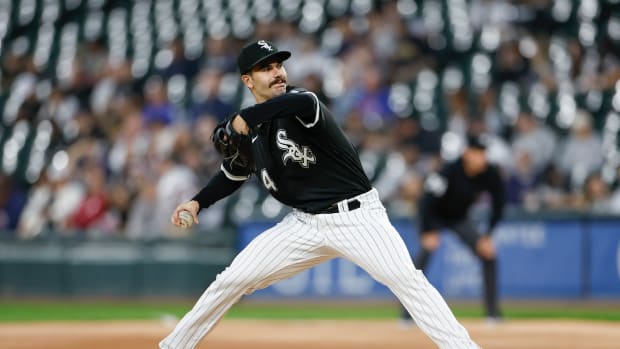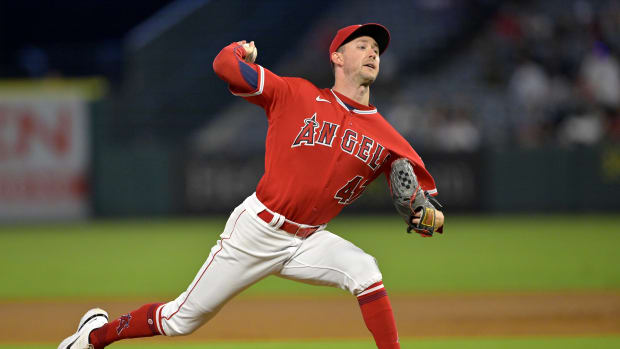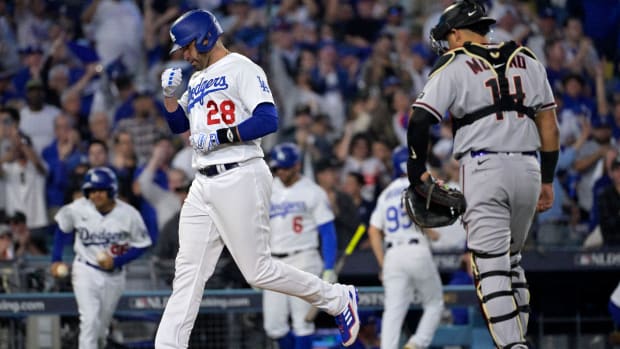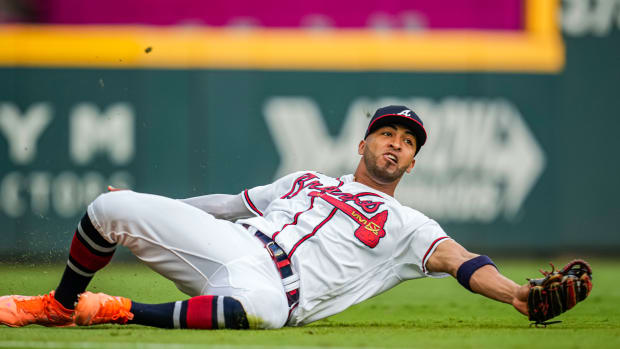ALDS Preview: White Sox-Rays
Each year the White Sox graciously host a University of Chicago alumni event, where Christina Kahrl and I speak to 150 or more nerds in the U.S. Cellular Conference & Learning Center. The group gets tickets to the game too -- which usually means a contest against the Orioles or the Royals, or perhaps a thrilling interleague tilt against the Pirates; clubs that don't motivate many Chicagoans to give up an afternoon from their short summers to come out to the ballpark.
This year's matchup, booked months in advance, was against the Rays, presumably about as irrelevant as it gets. But, of course, it turned out to be one of the best baseball games of the year, not just because of the blown interference call that allowed A.J. Pierzynski to remain on base and score the winning run in the bottom of the 10th (a run without which the White Sox would have missed the playoffs), but also because of the caliber of teams involved. Yes, PECOTA saw the Rays coming (and no, it didn't see the White Sox). But this was one year when karma played nice, rewarding two smart clubs with a little bit of luck to help propel them into the playoffs.
The White Sox scored 811 runs to the Rays' 774, a small difference essentially mitigated by the teams' respective home ballparks. That is not to suggest, however, that these teams are equally well-equipped for the playoffs. The White Sox scored those 811 runs while having Carlos Quentin and Joe Crede in their lineup for most of the year, two players who combined for a 59.2 VORP (the vast majority of that coming from Quentin), but who are injured and remain out of the ALDS. The Rays, meanwhile, scored their 774 without the services of Carl Crawford and Evan Longoria for long portions of the season, but both of whom are now ready to go, although Crawford will be returning without having played in the last seven weeks of the regular season.
So indeed, the difference in offensive firepower is rather stark. Apart from the reliable Jermaine Dye-Jim Thome combo, and the plucky contributions of Alexei Ramirez in the seven hole -- he's emerged as a sort of mini-me version of Alfonso Soriano -- there isn't a whole lot to like in the White Sox' lineup. Orlando Cabrera is, on his good days, an adequate leadoff hitter, and on his bad days something less than that. Dewayne Wise and his .293 OBP will start in left field rather than Nick Swisher (at least against right-handed pitching), a decision I find hard to fathom. Ken Griffey Jr. has yet to re-adjust to American League pitching; Paul Konerko had a down year (though an excellent second half); Juan Uribe was a replacement-level bat at shortstop, and now he's starting at third base. Expect a lot of solo home runs and not much else; the White Sox are going to need to keep this a low-scoring series if they want to win it.
The Rays, by contrast, have perhaps only one easy out in their lineup, in the form of Jason Bartlett, who nevertheless managed to post numbers nearly identical to those of Cabrera, the Sox' leadoff hitter. Otherwise, theirs is a fairly classically-constructed lineup, with on-base guys at the top, power in the middle and whatever is left at the end. The one saving grace for the White Sox is that the Rays are significantly weaker against left-handed pitching, having hit just .246/.330/.396 against southpaws this year as a club, which means trouble against Mark Buehrle and John Danks, two of the better lefties in the league.
Granted, they didn't have great years -- and most of Josh Fields' was spent in Charlotte -- but the White Sox bench looks stronger than it "should" because both Swisher and Fields arguably ought to be in the starting lineup. Still, they are relatively good bats to have coming off of the bench, while Brian Anderson is an outstanding defensive replacement in center. What's a bit unusual, though, is that the Sox are not carrying a natural middle-infield backup. This is principally because Uribe can slide over to play shortstop or second base if needed, with Fields taking over at third, but it does limit the White Sox' tactical flexibility some, and if there's a 14-inning game and Konerko ends up playing third base or something like that, don't say you weren't warned.
The Rays, meanwhile, have at least four quality bats off the bench, and an abundance of positional flexibility, having made the (smart) decision to carry 10 pitchers rather than 11. Expect Gabe Gross and Cliff Floyd to be platooned aggressively, and for Joe Maddon to have little reluctance to pinch-hit for Bartlett. This is everything you want in a playoff bench, simply put, although backup catcher Michel Hernandez is perhaps the least likely of any of the 200 players who made postseason rosters to actually see any playing time.
The pitchers are listed here in the order in which they're expected to appear in Games 1 through 4, but there is an important asterisk: In Game 5, the Game 2 starters will be able to pitch on normal rest. Chicago has already hinted that Buehrle would start a Game 5, allowing the Sox to deploy three left-handed starters in five games, exploiting the Rays on by far their weaker side of the plate. And one would probably expect Maddon to do the same with Scott Kazmir.
The White Sox' rotation is somewhat under-appreciated. Danks won the biggest game of his life on Tuesday and is the sort of player who could become a household name in the postseason. Javier Vazquez is a considerably better pitcher than his ERA suggests, having placed fourth in the American League in strikeouts (though, like Shane Reynolds or Eric Milton, he may be one of those pitchers who is cosmically fated to underperform his peripherals). Gavin Floyd combined a lucky first half with a legitimately good second. And Buehrle is Buehrle. Chicago's rotation is not as glitzy as Boston's or Los Angeles's, but it is not giving anything up to them.
Still, the Rays have the trump card in Kazmir, who is by some margin the best pitcher on either roster. Kazmir's flaw is that he can be wild, but the White Sox have a tendency to chase pitches, so he's not a good matchup for them. Indeed, patience will be the key against Kazmir, as he can rack up high pitch counts and does not throw particularly deep into games; that is, in fact, why the Rays have slotted him second -- so that they can churn through their bullpen on Friday if needed, in advance of Saturday's off day. If I'm Ozzie Guillen, I'm giving my hitters the take sign a lot against Kazmir in the early going and hoping he pitches himself out while Buehrle holds the damage down. To the extent that the Rays have a real vulnerability, it is probably Andy Sonnanstine, who can give up a fair number of extra-base hits and who will have to pitch in Game 4 at the Cell.
Closer Troy Percival, who battled numerous injuries in the second half, will miss the series, and Edwin Jackson was squeezed out by the numbers game. The loss of Percival is no big deal, since he was probably no better than the fourth-best member of this bullpen, the stars of whom are really J.P. Howell and Grant Balfour, who like Kazmir should find plenty of success in getting the Sox to chase pitches. Rookie David Price is a neat wild card -- the White Sox have never faced him (in fact, none of the playoff clubs have), and virgin matchups like that tend to favor the pitcher.
One could gripe about the inclusion of Chris Richard and Adam Russell in the White Sox' bullpen as opposed to a 15th position player or perhaps a pitcher like Boone Logan who is a bit more of a specialist, but those guys are only going to pitch in blowouts anyway. The action, rather, is from the Jenks/Thornton/Linebrink/Dotel quarter, all of whom had excellent seasons and each of whom confront hitters with a different type of challenge. To the extent that there's a weak link in the group, it may actually be Jenks, whose strikeout rate (38 in 61 2/3 innings) has deteriorated significantly to the point where it was below league average. Instead, Jenks is a command-and-control guy masquerading in a power-pitchers' body; he knows how to pitch to the situation and how to keep the ball down. It's a neat trick, but if the Rays do a good job of advance scouting, he may be exploitable.
The White Sox' defense checked in at 18 runs below average on the year. A lot of that was from Ramirez, who registered a -16 but whose defense I actually like a lot personally, even if it's a bit unorthodox and sandlot-ish at times. The left side of the infield ought to be quite good with Cabrera and Uribe, who is overqualified for third base (if not quite as crisp there as Crede). There is a major liability, however, in center field, a position that Griffey shouldn't have been playing five years ago, and certainly shouldn't be playing now at age 38. With Anderson on the roster, Guillen should be considering making a defensive substitution as early as the sixth inning should the White Sox hold the lead.
The Rays, meanwhile, made what may have been the greatest year-over-year defensive turnaround in major league history, going from an unfathomably bad -117 FRAA last year to a superlative +59 this year. Longoria, Crawford (if healthy), Bartlett, Carlos Pena and Dioner Navarro are all considerably above-average defenders, and B.J. Upton has made significant progress in center field, with his skills finally catching up to his tools. Only right field and second base are modest liabilities. Expect to be very impressed with the Rays defense; if they advance to the World Series, there is an excellent chance that at least one win will have been buoyed by an outstanding defensive play.
Maddon is almost certainly going to win the AL Manager of the Year award, and it is well-deserved, as the Rays outperformed their Pythagorean record by five games en route to their unexpected division title. The Rays led baseball with 142 steals, which has caused some to assume that Maddon favors small-ball. But make no mistake: He's a Moneyball guy at heart, merely one who knows how to take advantage of his team's strengths. Expect a fair dose of creativity, too. In the Aug. 24 game that Christina and I witnessed, Maddon brought Upton all the way in from center field on the final at-bat, giving the Rays five infielders. Of course, it didn't work -- Ramirez lackadaisically hit a bloop single to right field with nobody within 20 yards of the ball -- but Maddon is no slave to orthodoxy.
Guillen does not over-manage, as you might have been tempted to infer from his playing career, and is particularly adept (with an assist from Don Cooper) at managing his pitching staff. The price is that he can be stubborn and stick with his guys a little too long; hence the decision to play Wise rather than Swisher. But the Sox have a 13-1 record between their 2005 post-season run and their two de facto playoff games on Monday and Tuesday, and at some point you have to give him the benefit of the doubt.
With the White Sox missing Quentin and Crede, the Rays are simply the better baseball club. Their principal vulnerability is their comparative weakness against left-handed pitching, but they hedge against that well by having Kazmir lined up to duel Buehrle. I expect the Sox to make a series of it -- especially if they can steal Game 1, which would seem to present the most favorable matchup for the Rays on paper (home game against a righty). But the percentage play is Rays in five.


































